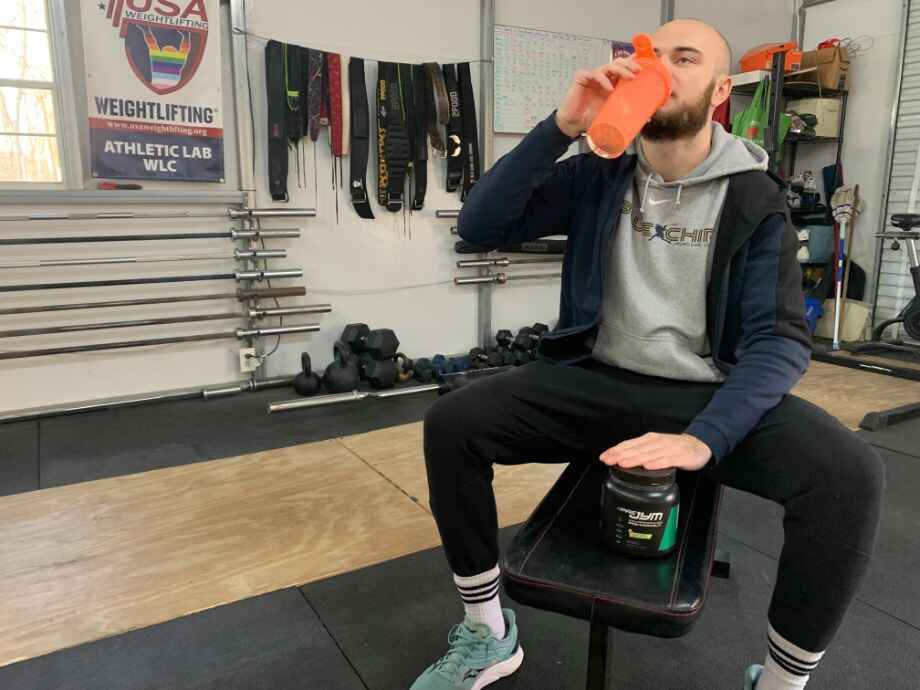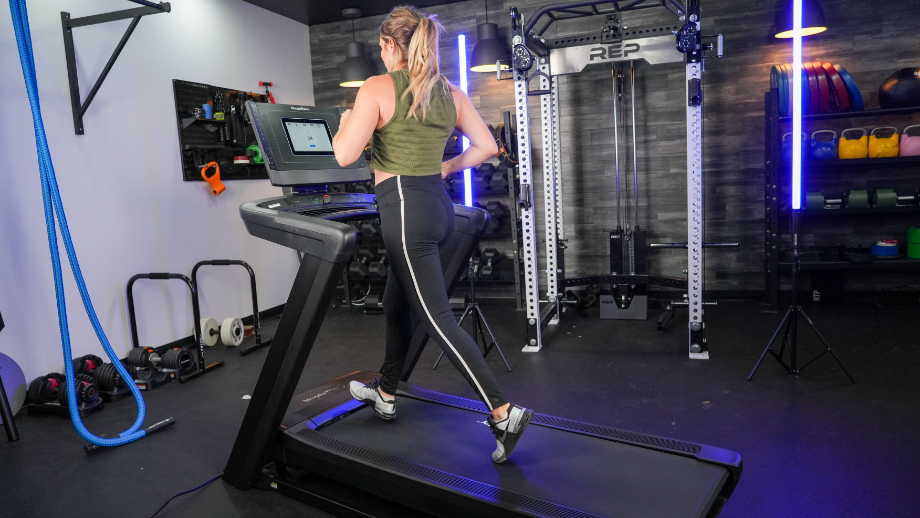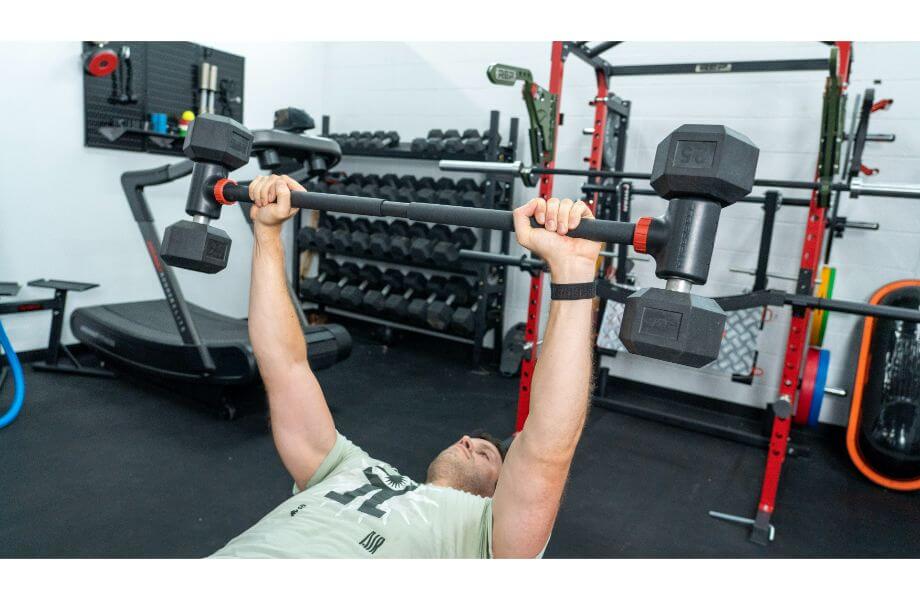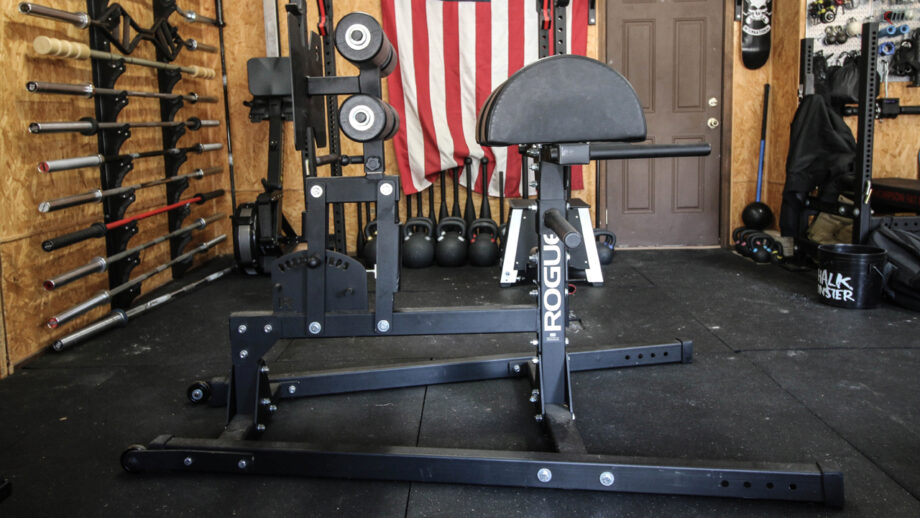Knowing the answers to these two questions is key to fully unlocking the potential of pre-workouts: 1) What’s the pre-workout formula? and 2) How long does it take for pre-workout to kick in?
Luckily, we’ve outlined what to look for in a pre-workout to fully satisfy question #1. We also understand when you should take pre-workout to grab those gains by the barbell, including if the general instruction to take “30 minutes before a workout” applies to all.
If you’re searching for the answer before your run or weightlifting training session, go ahead and grab your pre-workout and jump to the end. We forgive you, because you might not have much more than 30 minutes to spare!
Medical disclaimer: This article is intended for educational and informational purposes only. It is not intended as a substitute for medical advice. For health advice, contact a licensed healthcare provider.
Factors Affecting Your Pre-Workout Kick-In
Let’s first clarify: Many factors impact how you respond to pre-workout, including how intensely you feel the effects and how long it lasts. “Kick-in” time refers to when you can expect the intended effects, which may be influenced by fasted or fed states, the pre-workout formula, caffeine tolerance, and other factors.
Fasted vs Fueled
Pre-workout supplements often contain the stimulant caffeine1, and its effects typically kick in within 45 to 60 minutes. However, peak caffeine levels can vary, ranging from 15 to 120 minutes, with slower absorption occurring when caffeine is consumed with a meal2.
Research3 suggests combining caffeine with carbs extends peak levels (120-210 minutes) but enhances physical performance and recovery. So, if you consume the best pre-workout food and wash it down with pre-workout, the ergogenic effects may be delayed but are still up for grabs.
Caffeine Sensitivity and Tolerance
Caffeine tolerance reduces the effects of caffeine with regular use, while sensitivity heightens the responses to even small caffeine doses. Tolerances and sensitivities may not affect the kick-in time but can alter how pre-workout effects are perceived: A caffeine-tolerant person might not feel much, whereas a sensitive individual will likely feel more intense effects with the same formula.
Research4 also warns that habitual caffeine ingestion may diminish potential strength and athletic performance gains from high caffeine doses. Furthermore, a 2019 study5 indicates that the performance benefits of consistent caffeine intake may wane with prolonged use.
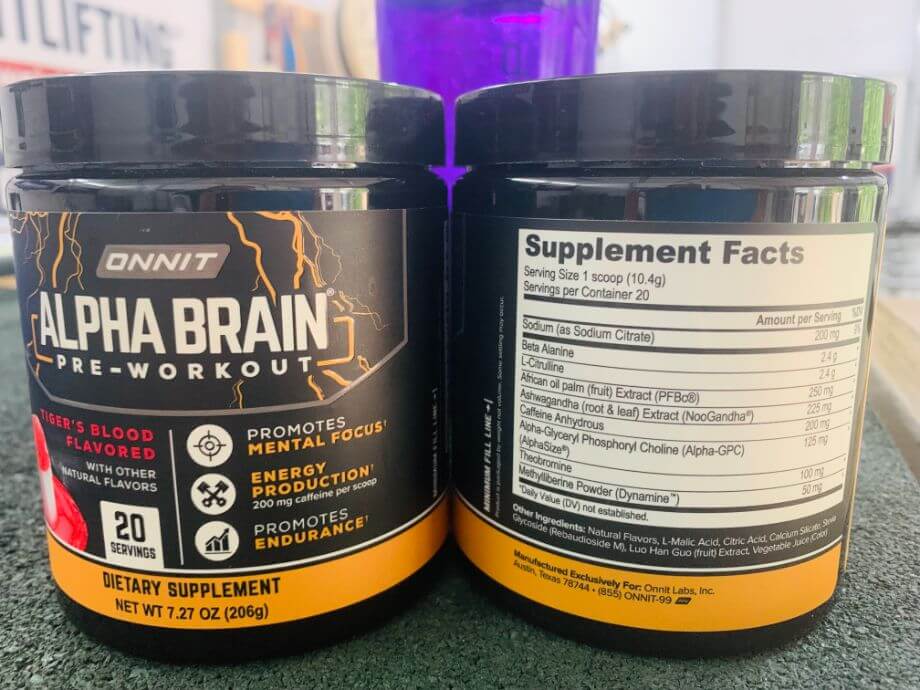
Form and Source of Caffeine
Pre-workout products are usually in powder form, but caffeine alternatives—like caffeinated gum and capsules—are on the rise and can affect onset time, thus influencing when you should consume for best results. For instance, the International Society of Sports Nutrition6 (ISSN) indicates caffeine gum is absorbed faster than capsules.
Individual Differences
Now here is where the pre-workout water (yes, consume with water and DON’T dry scoop pre-workout!) can get muddy, mainly when caffeine is in the mix. Many individual variations—like genetic makeup, fitness level, and gender—can change caffeine’s metabolism, absorption, and effects:
- Genetics: Certain genes affect caffeine metabolism and its ergogenic benefits, and a 2017 study7 explains CYP1A2 AA genotypes tend to experience a more substantial ergogenic effect than C allele carriers. However, the researchers hypothesize that C allele carriers may not experience reduced ergogenic effects but rather a longer metabolism time, making timing more critical.
- Leanness and fitness levels: A 2014 study8 shows endurance-trained athletes have lower peak caffeine concentrations than active males, while higher fat mass is associated with higher concentrations of caffeine.
- Gender: A recent 2023 study9 suggests that men and women report distinct positive and negative effects of caffeine after one hour of ingestion. The researchers emphasize the significance of factors associated with caffeine side effects, as they could have a crucial impact on athletic performance. Additionally, similar to above study8, body composition differences, particularly in terms of fat-free mass, are likely responsible for these variations.
Other factors, such as smoking, pregnancy, and taking certain medications, can influence caffeine absorption. However, they primarily affect the duration and intensity rather than its onset speed.
Pre-Workout Formula
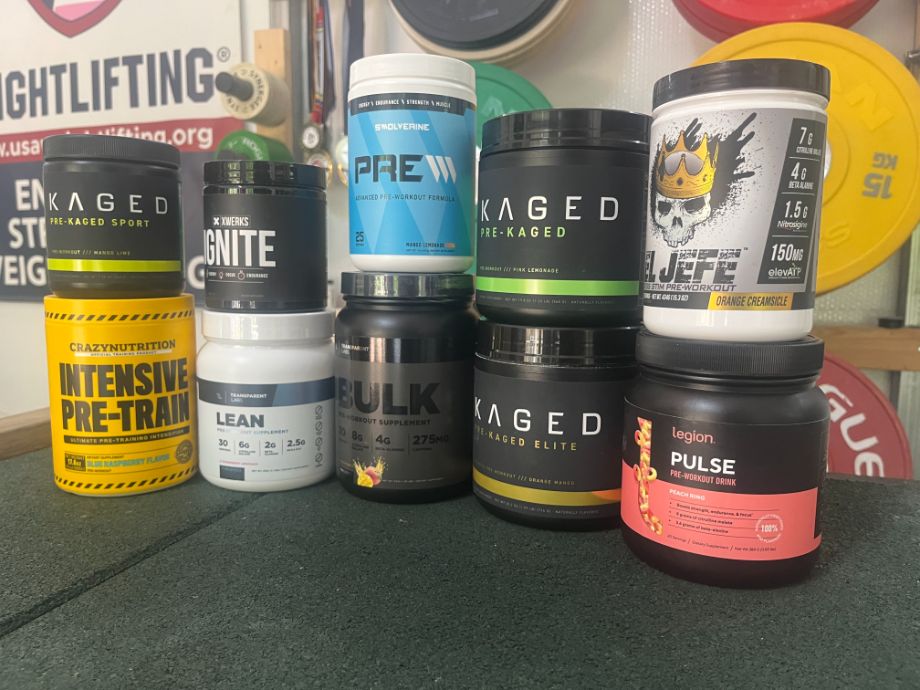
When reviewing high-quality pre-workout products, no formula is identical: some include electrolytes to augment hydration, while others feature branched-chain amino acids (BCAAs) and l-theanine, and most share similar key ingredients.
However, the most dominating onset factors are whether they contain caffeine or come in a proprietary blend. While we’ve discussed caffeine and will touch on it again, let’s chat about proprietary blends.
Pre-workout supplements with proprietary blends do not disclose the specific dosages of their active ingredients. Imagine having a high caffeine tolerance but unknowingly consuming only 150 milligrams of caffeine. Your “kick-in” time may be delayed or nonexistent, not to mention the potential waste of money and missed gains due to ineffective dosages.
Common Pre-Workout Ingredients
Since pre-workout formulas can differ, it’s helpful to gain a clearer understanding of which pre-workout ingredients to watch for and their current intake recommendations for maximum benefits. Below, we provide a general overview of common ingredients in pre-workouts10 and their expected onset times.
Caffeine
Caffeine6 is the world’s most widely consumed stimulant known for enhancing alertness and reducing fatigue. Supplementing with caffeine may benefit various aspects of exercise—like muscular endurance, strength, and power—in trained and untrained individuals.
To reap these benefits, the ISSN6 recommends taking 3-6 milligrams of caffeine per kilogram of body weight (mg/kg) 60 minutes (1 hour) before exercise. For someone weighing 180 pounds (81.8 kilograms), this amounts to 254-491 milligrams of caffeine. To put this into perspective, a cup of coffee contains about 100 mg of caffeine.
RELATED: Coffee vs Pre-workout
Research11 further addresses whether you’re taking a low (2-3 mg/kg), moderate (3-6 mg/kg), or high (6-9 mg/kg) dose of caffeine, the max plasma peaks are consistently between 30 to 90 minutes. Taken together, 60 minutes seems to be the “sweet spot.”
Citrulline
Citrulline is often labeled as L-citrulline or citrulline malate, and malate is a crucial substrate for powering muscle contractions. Citrulline malate12 boosts nitric oxide production and vasodilation (widening of blood vessels and increasing blood flow), allowing more oxygen and nutrient delivery to the targeted muscles.
An 8-gram dose of citrulline malate 60 minutes (1 hour) before exercise is most effective for improving muscular endurance and strength performance. But the peak rapidly declines within 15 to 30 minutes after an hour, so you might need to react quickly to capitalize on this small “ergogenic window.”

Beta-Alanine
Ever wondered, “Why does pre-workout make you itch?” #Beta-alanine. But that itching and tingling sensation—clinically known as paresthesia—is harmless, and beta-alanine may delay fatigue and improve high-intensity exercise performance.
RELATED: What Is Beta-Alanine?
The ISSN13 recommends taking 4 to 6 grams of beta-alanine, for at least 2 to 4 weeks, to improve your exercise performance. Splitting beta-alanine doses throughout the day may help reduce potential side effects associated with beta-alanine.
So to fully experience the “kick-in” effects of beta-alanine, you’ll likely need to take it daily for at least 2 to 4 weeks.
Creatine
Creatine (especially creatine monohydrate) stands out in the vast world of dietary supplements, championed by the ISSN14 as the most ergogenic supplement for enhancing high-intensity exercise capacity. Creatine benefits range from fitness to general health, showing to support muscle growth and strength to improving glycemic control and brain function.
Despite the strong evidence to back it, the timing of creatine supplementation15 around exercise is unclear. While some evidence suggests exercise can enhance the creatine loading phase, timing seems less relevant after creatine saturates the muscles.
In general, the emphasis is less on creatine timing and more on consistently using the appropriate dose for your requirements. Daily intake of 3 to 5 grams is usually sufficient for maintaining creatine stores, though individuals with greater muscle mass may require more.
Taurine
Coined a “very essential” amino acid16, taurine is abundant in muscle tissues and throughout the body and wears many hats—like supporting energy metabolism and muscle function. While its effectiveness as an ergogenic agent is debated, taurine may enhance muscle contraction and mitigate muscle damage.
Researchers of a 2021 review17 make remembering dose and timing (almost) as easy as 1-2-3: Take 1-3 grams of taurine 1-3 hours (60-180 minutes) before your workout. For maximum effectiveness, you should consistently take for at least 6-21 days.
Tyrosine
Tyrosine18 is another amino acid touted to boost alertness, yet its effectiveness on physical and cognitive performance is inconclusive. However, supplementing tyrosine alongside caffeine and taurine may provide ergogenic benefits, according to a 2019 study.19
Research does not establish an optimal tyrosine dose or timing, but a standard guideline proposes 100-150 mg/kg of body weight, with the effects usually appearing 60-300 minutes after consumption. However, researchers recommend taking it 2 hours prior to align with peak plasma levels at around 120 minutes.
Types of Pre-Workout Supplements
While various types of pre-workouts are available, we’ll focus on those that may impact the onset period while dispelling assumptions.
Stim-Free Pre-Workouts
Compared to standard pre-workouts with caffeine, stim-free versions lack stimulants but include key ingredients like citrulline and beta-alanine. Stim-free pre-workouts often contain nootropics to elicit the benefits of pre-workouts, although caffeine-containing products may do the same.
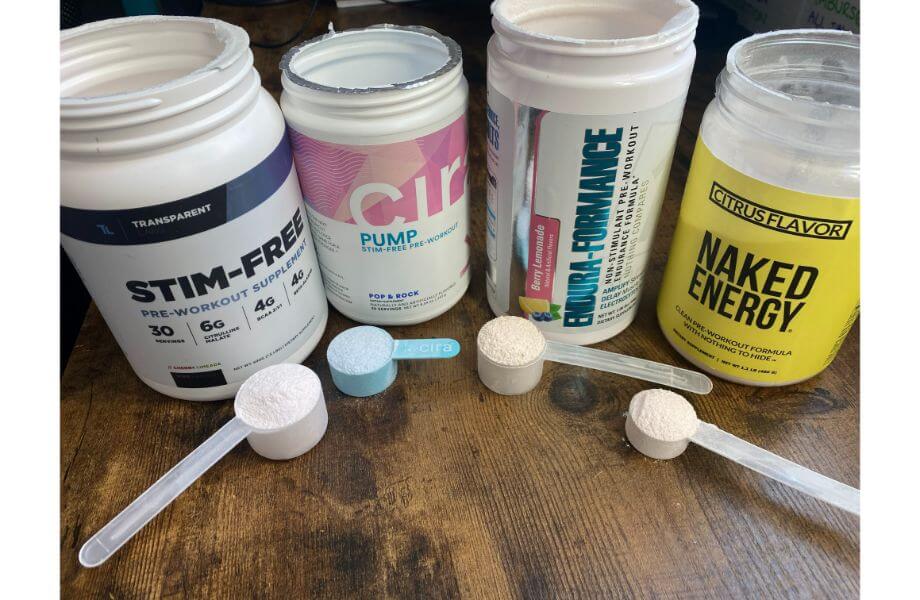
While the onset time may be assumed to differ between the two, both are likely to take effect around the 1-hour mark. The significant distinction is that non-stim pre-workouts may wear off faster due to caffeine’s 3- to 5-hour half-life.
Carb-Enhanced Pre-Workouts
If we’re getting technical, carb supplements could fit under the “pre-workout” umbrella since they work to fuel and enhance your workout. And since we’ve opened the box, energy drinks are often used as a pre-workout and are laden with added sugar.
It’s important to note that carbohydrates and added sugar (simple carbs) might affect the onset time, potentially causing delays when consuming these pre-workout drinks.
Non-Powder Pre-Workouts
Pre-workout powders might be the most commonly used, although gums, capsules, and other forms are increasing in popularity. The onset time can vary from one source to the next, so it’s smart to time your workout to match.
How Long Does It Take for Pre-workout to Kick In? Final Thoughts

Pre-workout typically takes around 1 hour to kick in. Revisit the “Common Pre-Workout Ingredients” section for the nitty-gritty details, especially if you jumped straight here for the answer—after crushing your workout, of course!
Most pre-workout supplements also recommend taking them about 30 minutes before your workout. This allows you 30 minutes to start feeling that energy boost, get your heart rate up, and prep your muscles with warm-up sets.
The amount of caffeine is more likely to impact duration and intensity, not the onset, though sensitivities and tolerances can alter the perceptions of caffeine’s effects. The good news is there are many stim and non-stim pre-workouts to test run, and there’s surely one that best matches your unique fitness goals and tolerances.
How Long Does It Take for Pre-workout to Kick In? FAQs
How do you know when your pre-workout kicks in?
The effects of pre-workout can vary based on the individual and formula, especially comparing a stim vs non stim pre-workout, though individuals are likely to experience a boost in energy levels (mostly with caffeine) and greater focus.
Does pre-workout kick in fast?
Pre-workouts generally kick in within 1 hour, though meal timing and other factors such as formulations can also influence absorption rates.
How long does pre-workout last?
How long a pre-workout supplement lasts depends on its formulation ingredients, although caffeine, arginine, and citrulline are key factors. Based on the available evidence of these ingredients, pre-workout effects typically last from 30 minutes to 2 hours.
Is it bad to take pre-workout on an empty stomach?
Taking pre-workout on an empty stomach is an individual preference, though it may cause unpleasant symptoms—such as lightheadedness, dizziness, and fainting—similar to fasted cardio. And especially your goal is to build muscle, it’s smart to prioritize nutrition around your training (or at least keep an expert-tested protein powder handy).
These statements have not been evaluated by the Food and Drug Administration. This product is not intended to diagnose, treat, cure, or prevent any diseases.
References
- Institute of Medicine (US) Committee on Military Nutrition Research. Caffeine for the Sustainment of Mental Task Performance: Formulations for Military Operations. Washington (DC): National Academies Press (US); 2001. 2, Pharmacology of Caffeine. Available from: https://www.ncbi.nlm.nih.gov/books/NBK223808/
- McLellan TM, Caldwell JA, Lieberman HR. A review of caffeine’s effects on cognitive, physical and occupational performance. Neurosci Biobehav Rev. 2016 Dec;71:294-312. doi: 10.1016/j.neubiorev.2016.09.001. Epub 2016 Sep 6. PMID: 27612937.
- Martins GL, Guilherme JPLF, Ferreira LHB, et al. Caffeine and Exercise Performance: Possible Directions for Definitive Findings. Front Sports Act Living. 2020;2:574854. Published 2020 Dec 11. doi:10.3389/fspor.2020.574854
- Wilk M, Krzysztofik M, Filip A, Zajac A, et al. The Effects of High Doses of Caffeine on Maximal Strength and Muscular Endurance in Athletes Habituated to Caffeine. Nutrients. 2019 Aug 15;11(8):1912. doi: 10.3390/nu11081912. Erratum in: Nutrients. 2019 Nov 04;11(11): PMID: 31443220; PMCID: PMC6722777.
- Lara B, Ruiz-Moreno C, Salinero JJ, et al. Time course of tolerance to the performance benefits of caffeine. PLoS One. 2019;14(1):e0210275. Published 2019 Jan 23. doi:10.1371/journal.pone.0210275
- Guest NS, VanDusseldorp TA, Nelson MT, et al. International society of sports nutrition position stand: caffeine and exercise performance. J Int Soc Sports Nutr. 2021;18(1):1. Published 2021 Jan 2. doi:10.1186/s12970-020-00383-4
- Pickering C, Kiely J. Are the Current Guidelines on Caffeine Use in Sport Optimal for Everyone? Inter-individual Variation in Caffeine Ergogenicity, and a Move Towards Personalised Sports Nutrition. Sports Med. 2018 Jan;48(1):7-16. doi: 10.1007/s40279-017-0776-1. PMID: 28853006; PMCID: PMC5752738.
- Skinner TL, Jenkins DG, Leveritt MD, et al. Factors influencing serum caffeine concentrations following caffeine ingestion. J Sci Med Sport. 2014 Sep;17(5):516-20. doi: 10.1016/j.jsams.2013.07.006. Epub 2013 Aug 7. PMID: 23932441.
- Domaszewski P. Gender Differences in the Frequency of Positive and Negative Effects after Acute Caffeine Consumption. Nutrients. 2023;15(6):1318. Published 2023 Mar 7. doi:10.3390/nu15061318
- Jagim AR, Harty PS, Camic CL. Common Ingredient Profiles of Multi-Ingredient Pre-Workout Supplements. Nutrients. 2019;11(2):254. Published 2019 Jan 24. doi:10.3390/nu11020254
- Martins GL, Guilherme JPLF, Ferreira LHB, et al. Caffeine and Exercise Performance: Possible Directions for Definitive Findings. Front Sports Act Living. 2020;2:574854. Published 2020 Dec 11. doi:10.3389/fspor.2020.574854
- Gough LA, Sparks SA, McNaughton LR, et al. A critical review of citrulline malate supplementation and exercise performance. Eur J Appl Physiol. 2021;121(12):3283-3295. doi:10.1007/s00421-021-04774-6
- Trexler ET, Smith-Ryan AE, Stout JR, et al. International society of sports nutrition position stand: Beta-Alanine. J Int Soc Sports Nutr. 2015;12:30. Published 2015 Jul 15. doi:10.1186/s12970-015-0090-y
- Buford TW, Kreider RB, Stout JR, et al. International Society of Sports Nutrition position stand: creatine supplementation and exercise. J Int Soc Sports Nutr. 2007;4:6. Published 2007 Aug 30. doi:10.1186/1550-2783-4-6
- Ribeiro F, Longobardi I, Perim P, et al. Timing of Creatine Supplementation around Exercise: A Real Concern?. Nutrients. 2021;13(8):2844. Published 2021 Aug 19. doi:10.3390/nu13082844
- Ripps H, Shen W. Review: taurine: a “very essential” amino acid. Mol Vis. 2012;18:2673-2686.
- Kurtz JA, VanDusseldorp TA, Doyle JA, et al. Taurine in sports and exercise. J Int Soc Sports Nutr. 2021;18(1):39. Published 2021 May 26. doi:10.1186/s12970-021-00438-0
- Attipoe S, Zeno SA, Lee C, et al. Tyrosine for Mitigating Stress and Enhancing Performance in Healthy Adult Humans, a Rapid Evidence Assessment of the Literature. Mil Med. 2015 Jul;180(7):754-65. doi: 10.7205/MILMED-D-14-00594. PMID: 26126245.
- Zaragoza J, Tinsley G, Urbina S, et al. Effects of acute caffeine, theanine and tyrosine supplementation on mental and physical performance in athletes. J Int Soc Sports Nutr. 2019 Nov 26;16(1):56. doi: 10.1186/s12970-019-0326-3. PMID: 31771598; PMCID: PMC6880365.


